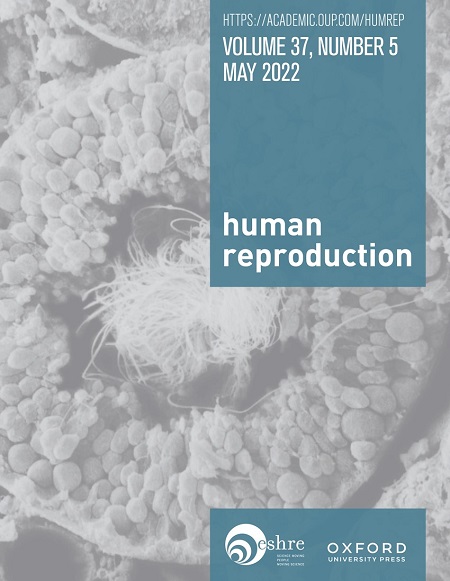生殖因素和生物老化:与全因和特定原因过早死亡的关系
IF 6.1
1区 医学
Q1 OBSTETRICS & GYNECOLOGY
引用次数: 0
摘要
研究问题 生殖因素是否与生物衰老有关,生物衰老是否会介导生殖因素与过早死亡之间的关系?简要解答 多种生殖因素与表型年龄加速(PhenoAge-Accel)有关,而坚持健康的生活方式可减轻这些有害影响;PhenoAge-Accel 可介导生殖因素与过早死亡率之间的关联。已知信息 加速衰老是导致死亡的一个关键因素,但有关生殖因素对衰老影响的知识却很有限。研究设计、规模、持续时间 这项前瞻性队列研究纳入了 2006-2010 年间英国生物库中 223 729 名 40-69 岁的女性,随访至 2021 年 11 月 12 日。通过触摸屏问卷收集生殖因素。生物衰老通过 PhenoAge-Accel 进行评估。我们使用多元线性回归模型来检验生殖因素与 PhenoAge-Accel 的关系,并估算健康生活方式的修正效应。此外,我们还运用中介分析法探讨了 PhenoAge-Accel 在生殖因素与过早死亡率之间的中介作用。主要结果和机会的作用 初潮早(<12 岁 vs 13 岁,β:0.37,95% CI:0.30,0.44)、初潮晚(≥15 岁 vs 13 岁,β:0.18,95% CI:0.11,0.25)、绝经早(<45 岁 vs 50-51 岁,β:0.62,95% CI:0.51,0.72)、生育期短(<30 岁 vs 35-39 岁,β:0.81,95% CI:0.70,0.92)、无效生育(对 2 次活产,β:0.36,95% CI:0.30,0.43)、高奇偶数(≥4 对 2 次活产,β:0.49,95% CI:0.40,0.59)、首次活产年龄早(<20 岁 vs 25-29 岁,β:0.66,95% CI:0.56,0.75)和死胎(β:0.51,95% CI:0.36,0.65)与 PhenoAge-Accel 增加有关。此外,PhenoAge-Accel 在生殖因素与过早死亡之间的关系中起着 6.0%-29.7% 的中介作用。与生活方式良好且无生殖风险因素的妇女相比,生活方式不良且有生殖风险因素的妇女的 PhenoAge-Accel 值最高。局限性和注意事项 英国生物数据库的参与者主要是白人,因此在将这些研究结果推广到其他种族群体时需要谨慎。研究结果的广泛意义 我们的研究结果揭示了多种生殖因素对生物衰老的有害影响,以及生物衰老在生殖因素与过早死亡之间的关联中的中介作用。这些发现强调了坚持健康的生活方式以延缓生物衰老的重要性,这是降低具有生殖风险因素的女性过早死亡率的一种潜在方法。研究经费/利益冲突 本研究得到了国家自然科学基金(82003479、82073660、72204215)、湖北省自然科学基金(2023AFB663)、浙江省公益技术应用研究项目(GF22H269155)和中国博士后科学基金(2019M662646、2020T130220)的资助。作者没有需要披露的利益冲突。试验注册号为 n/a。本文章由计算机程序翻译,如有差异,请以英文原文为准。
Reproductive factors and biological aging: the association with all-cause and cause-specific premature mortality
STUDY QUESTION Are reproductive factors associated with biological aging, and does biological aging mediate the associations of reproductive factors with premature mortality? SUMMARY ANSWER Multiple reproductive factors are related to phenotypic age acceleration (PhenoAge-Accel), while adherence to a healthy lifestyle mitigates these harmful effects; PhenoAge-Accel mediated the associations between reproductive factors and premature mortality. WHAT IS KNOWN ALREADY Accelerated aging is a key contributor to mortality, but knowledge about the effect of reproductive factors on aging is limited. STUDY DESIGN, SIZE, DURATION This prospective cohort study included 223 729 women aged 40–69 years from the UK biobank in 2006–2010 and followed up until 12 November 2021. PARTICIPANTS/MATERIALS, SETTING, METHODS Reproductive factors were collected through a touchscreen questionnaire. Biological aging was assessed through PhenoAge-Accel. Multiple linear regression models were used to examine the relationships of reproductive factors with PhenoAge-Accel and estimate the modified effect of a healthy lifestyle. Furthermore, we applied mediation analysis to explore the mediating role of PhenoAge-Accel in the associations between reproductive factors and premature mortality. MAIN RESULTS AND THE ROLE OF CHANCE Early menarche (<12 years vs 13 years, β: 0.37, 95% CI: 0.30, 0.44), late menarche (≥15 years vs 13 years, β: 0.18, 95% CI: 0.11, 0.25), early menopause (<45 years vs 50–51 years, β: 0.62, 95% CI: 0.51, 0.72), short reproductive lifespan (<30 years vs 35–39 years, β: 0.81, 95% CI: 0.70, 0.92), nulliparity (vs two live births, β: 0.36, 95% CI: 0.30, 0.43), high parity (≥4 vs 2 live births, β: 0.49, 95% CI: 0.40, 0.59), early age at first live birth (<20 years vs 25–29 years, β: 0.66, 95% CI: 0.56, 0.75), and stillbirth (β: 0.51, 95% CI: 0.36, 0.65) were associated with increased PhenoAge-Accel. Furthermore, PhenoAge-Accel mediated 6.0%–29.7% of the associations between reproductive factors and premature mortality. Women with an unfavorable lifestyle and reproductive risk factors had the highest PhenoAge-Accel compared to those with a favorable lifestyle and without reproductive risk factors. LIMITATIONS, REASONS FOR CAUTION The participants in the UK Biobank were predominantly of White ethnicity; thus, caution is warranted when generalizing these findings to other ethnic groups. WIDER IMPLICATIONS OF THE FINDINGS Our findings reveal the harmful effects of multiple reproductive factors on biological aging and the mediating role of biological aging in the associations between reproductive factors and premature mortality. They highlight the significance of adhering to a healthy lifestyle to slow biological aging as a potential way to reduce premature mortality among women with reproductive risk factors. STUDY FUNDING/COMPETING INTEREST(S) This study was funded by the National Natural Science Foundation of China (82003479, 82073660, 72204215), Hubei Provincial Natural Science Foundation of China (2023AFB663), Zhejiang Province Public Welfare Technology Application Research Project (GF22H269155), and China Postdoctoral Science Foundation (2019M662646, 2020T130220). The authors have no competing interests to disclose. TRIAL REGISTRATION NUMBER N/A.
求助全文
通过发布文献求助,成功后即可免费获取论文全文。
去求助
来源期刊

Human reproduction
医学-妇产科学
CiteScore
10.90
自引率
6.60%
发文量
1369
审稿时长
1 months
期刊介绍:
Human Reproduction features full-length, peer-reviewed papers reporting original research, concise clinical case reports, as well as opinions and debates on topical issues.
Papers published cover the clinical science and medical aspects of reproductive physiology, pathology and endocrinology; including andrology, gonad function, gametogenesis, fertilization, embryo development, implantation, early pregnancy, genetics, genetic diagnosis, oncology, infectious disease, surgery, contraception, infertility treatment, psychology, ethics and social issues.
 求助内容:
求助内容: 应助结果提醒方式:
应助结果提醒方式:


